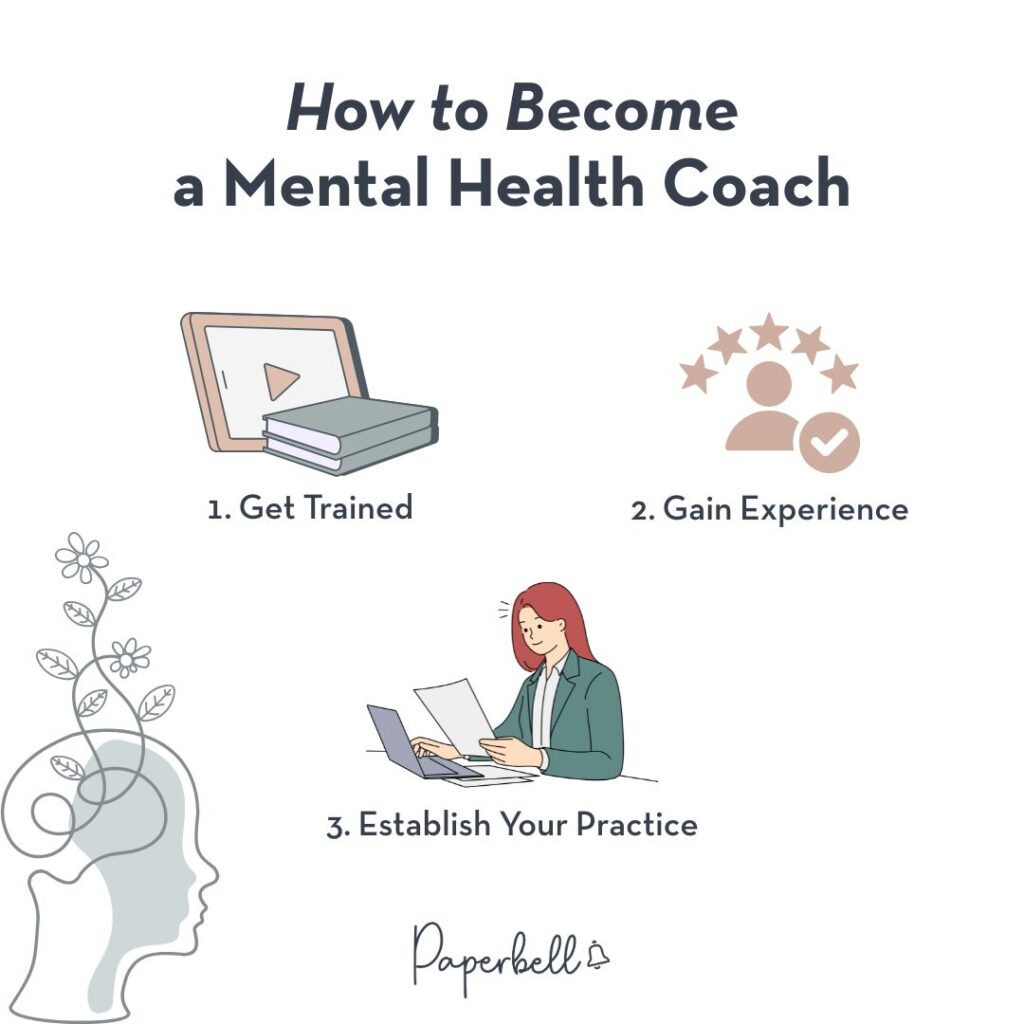Almost one in four adults in the U.S. experiences mental health concerns, yet finding the right support isn’t always easy. With so many therapists carrying waitlists (and many unable to access care at all), the need for an alternative has never been greater, especially among younger adults and minorities.
That’s where mental health coaching can help. While it’s not the same as therapy, it gives people practical tools to manage stress, build resilience, and take better care of their well-being. As a coach, it’s important to know exactly what you can (and can’t) offer clients, and how to use evidence-based methods to make a real difference.
In this guide, you’ll learn how to become a certified mental health coach and build a fulfilling career helping people improve their quality of life.
What Do Mental Health Coaches Do?
Mental health coaches help clients improve their emotional well-being, manage stress, and build resilience. They focus on non-clinical challenges, like anxiety, overwhelm, or burnout, without diagnosing or treating mental illness.
Unlike general life coaches, they draw on evidence-based approaches such as Mindfulness-Based Stress Reduction (MBSR), breathwork, and structured coaching frameworks to help clients identify stressors and develop practical coping strategies.
Mental health coaching gives clients concrete tools to manage emotions and improve daily functioning, such as:
- Asking reflective questions that encourage self-awareness
- Offering new perspectives to handle obstacles and emotions
- Building self-compassion by recognizing personal strengths
- Teaching communication and relationship skills
- Creating personalized action steps and keeping clients accountable
Over time, these methods help clients become more self-reliant and confident in managing difficult emotions or situations. Coaching provides both structure and perspective, guiding clients toward long-term habits that support their mental and emotional health.
Pro tip: As your coaching practice grows, Paperbell takes care of your bookings, payments, contracts, website, client surveys, and more. Try it for free with your first client.ne’s life and keep clients accountable for long-term behavior changes supporting their mental health. Clients learn to apply new strategies to their daily lives through personalized assignments and insightful sessions for lasting transformation.
What’s the Difference Between a Mental Health Coach and a Therapist?
Mental health coaches and therapists both support clients in improving their well-being, but they work in different ways.
| Aspect | Mental Health Coach | Therapist |
| Credentials | Certified through programs accredited by organizations like the International Coaching Federation (ICF). | Holds at least a master’s degree in psychology or a related field and must be licensed by the state. |
| Area of focus | Focuses on the present and future, providing support for personal development and behavioral change. | Addresses past and present challenges, with training to provide clinical treatment for mental illness. |
| Medication | Does not prescribe medication. | May prescribe medication as part of the treatment plan. |
| Diagnoses | Cannot diagnose mental illness. | Diagnoses and treats mental health disorders using clinical assessment. |
| Approach | Uses coaching techniques and principles, drawing from evidence-based therapies like Cognitive Behavioral Therapy (CBT). | Uses clinical therapy techniques and provides traditional mental health services like talk therapy. |
| Accountability | Holds clients accountable for personal development goals and behavioral change through regular sessions and homework assignments. | Provides structured therapy sessions with ongoing assessment and treatment planning. |
One of the most significant differences between the two is that therapists can diagnose mental illness, while coaches cannot.
Therapists make these assessments using the Diagnostic and Statistical Manual of Mental Disorders (DSM) published by the American Psychiatric Association. This standardized system helps them:
- Identify symptoms
- Confirm diagnoses
- Create treatment plans based on recognized clinical criteria
In everyday language, terms like anxiety or depression are often used casually, which can blur the line between normal emotional responses and diagnosable conditions.
For example, feeling anxious before a big event is normal, but Generalized Anxiety Disorder (GAD) involves persistent, excessive worry that disrupts daily life. Similarly, feeling low for a few days is not the same as developing Major Depressive Disorder, which includes prolonged sadness, loss of interest, and impaired functioning.
As a coach, if you notice that a client’s symptoms are affecting their ability to function day to day (struggling to work, care for themselves, or maintain relationships), it’s important to refer them to a licensed mental health professional.
How to Become a Mental Health Coach
If you want to start a career as a mental health coach, you’ll need both specialized training and the right personal qualities.
A background in psychology, counseling, or another mental health-related field can give you a head start, but it’s not required. Many successful coaches build their expertise through accredited coaching programs that focus on mental well-being.
However, strong communication, empathy, and active listening are must-haves for anyone entering this field, as well as staying current on mental health research and best practices.
Here are the three most crucial steps to starting a career in mental health coaching.
1. Get Trained
Most mental health coaches go through specialized training that goes beyond general coaching principles. They learn how to apply evidence-based practices and understand the psychology behind behavior change. Ethical guidelines are also a key part of training, including how to maintain professional boundaries and protect client confidentiality.
Choosing a niche within mental health coaching, such as mindfulness, trauma recovery, or neuro-linguistic programming (NLP), will help you find the right training program and tailor your services to your ideal clients.
Some well-known mental health certification options include:
- Mental Health Coach Certification Training by NLP
- Integrative Mental Health Coach Training Program by the Nickerson Institute
- Master Wellness Certification by Transformation Academy
- Integrative Trauma Practitioner Certification by the Aura Institute

To strengthen your credibility, look for programs accredited by respected organizations such as:
- American Association of Drugless Practitioners
- The Health Coach Alliance
- International Coaching Federation (ICF)
Accredited, specialized training doesn’t just build your skills; it also reassures clients that you’re qualified to support their mental well-being safely and effectively.
2. Gain Experience
If you have a background in social work or fields related to human psychology, you can leverage that experience in your coaching work. However, you should also practice conducting coaching sessions and applying the tools you’ve learned in your training in different coaching scenarios.

If you plan to earn credentials through the ICF, you’ll be required to log a specific number of paid and unpaid coaching hours. Most accredited programs also incorporate practice sessions so you can gain experience before working with real clients.
Alternatively, you can pick up skills by joining peer-coaching groups or practice communities to:
- Exchange feedback
- Refine your coaching style
- Build confidence
- Experience the process from the client’s point of view
Another great way to gain experience is by offering a few pro bono sessions to friends, family, or people in your network. These can help you gain testimonials, refine your process, and even attract future paying clients. Just be sure to set clear expectations and timeframes, treating these sessions as professionally as you would paid ones.
3. Establish Your Practice
Once you’ve completed your training, it’s time to turn your skills into a real business. Start by defining your ideal clients, designing your coaching packages, and setting your rates. Make sure your business is registered so you can handle taxes and contracts properly.
Here are a few ways to start attracting new clients:
- Build a professional online presence with a simple website and active social media profiles.
- Network within your community or industry to build relationships and referrals.
- Share free resources like worksheets or webinars to showcase your expertise.
- Use content marketing (blog posts, newsletters, or videos) to bring in organic leads.
- Partner with complementary businesses (like wellness centers or therapists) to reach more people.
- Experiment with paid ads once you have a clear offer and audience.
As clients start coming in, you’ll also need to manage scheduling, contracts, and payments. Paperbell can take care of your admin and website on a single platform built for coaches.
You can use it to sell packages, run surveys, and automate your email communication. Meanwhile, clients get their dedicated portal to review and manage their contracts, payments, bookings, and the materials you share with them. Try Paperbell for free with your first client.

Can Life Coaches Become Mental Health Coaches?
Yes, life coaches can absolutely transition into health and wellness coaching, including mental health coaching, though it usually requires additional training.
Life coaches are trained to help clients clarify goals, stay accountable, and make meaningful changes in their personal or professional lives.
Mental health coaches, on the other hand, receive specialized education in areas like emotional regulation and stress management. Many also hold degrees or certifications in psychology or mental health coaching to deepen their understanding of human behavior.
While life coaches focus on personal growth, mental health coaches work with clients to manage stress, anxiety, and other emotional challenges within a non-clinical scope. They combine core coaching principles with evidence-based strategies to support overall emotional well-being, without diagnosing or treating mental illness.
In short, if you’re already a life coach, becoming a mental health coach can be a natural next step to specialize your services.
How Much Do Mental Health Coaches Charge
Mental health coaching rates vary widely depending on the coach’s credentials, experience, niche, and location. On average, sessions range from $75 to $250 per hour, though established coaches may charge more for specialized support or extended programs.
Many coaches also offer package deals or sliding scale options to make their services more accessible. For example, Jes Baker, a somatic coach, charges $275 for a 90-minute Spirit Team Session and $300 a month for her year-long program, with occasional sliding scale spots.

[ Read: Your Dream Health Coach Website Template Is In This List ]
Your pricing can be just as flexible. The best approach is to research what other coaches in your niche charge, consider your qualifications, and align your rates with what your ideal clients can realistically invest.
How to Get Clients as a Mental Health Coach
Building a successful mental health coaching practice takes visibility, credibility, and consistency. Here are several effective ways to attract clients:
- Create a stunning website: Develop a professional coaching website that shows your expertise, services, and testimonials from past clients. Here’s an example from Gail Turner‑Cooper, Holistic Health Coach.
- Build an online presence: Use social media platforms where your clients will most likely hang out. See how Kim Murray engages her audience on Instagram with mental health-related content.
- Host workshops: Events related to your expertise allow you to reach multiple clients and demonstrate the value of your services. Here’s an example of a workplace mental health program for employees and managers.
- Offer free resources: Blog posts, e-books, and workbooks relevant to mental health can attract potential clients who resonate with your approach. Here’s an example of a Detox Toolbox offered by Joe Roe, Mental Health Coach.

- Network within your industry: Connect with company reps who value employee well-being and potential clients within mental health-related communities. For example, check out the Wellbeing at Work Summit.
- Use online directories: List your profile and coaching services on online directories like CoachCompare to increase your visibility so potential clients can easily find you online.
- Ask for referrals: Encourage satisfied clients to refer their friends or colleagues to you and offer incentives to motivate them to recommend your services.
Ultimately, the best way to grow your practice is to deliver real transformation. When clients experience meaningful progress, they naturally become your strongest advocates.
[ Read: How to Get Coaching Clients: 19 Strategies That Actually Work ]
How to Use Paperbell as a Mental Health Coach

Running a mental health coaching practice takes more than facilitating sessions. Paperbell automates your admin so you can focus on supporting your clients, not managing logistics. Here’s how:
- Speed up client onboarding: Share intake forms, get contracts signed, and collect payments automatically.
- Get bookings while you sleep: Clients can easily book sessions based on your availability, with no back-and-forth emails.
- Track packages and progress: See how many sessions each client has left and keep all session notes in one secure dashboard.
- Offer flexible payment options: Choose between subscriptions, payment plans, or one-time payments.
- Give clients a dedicated portal: Allow clients to manage their bookings, payments, contracts, surveys, and homework on their own.
- Set up a coaching website in minutes: Create a brand-aligned home page and checkout-ready landing pages for your packages.
Try Paperbell free with your first client and see how effortless running your practice can be.
FAQ
What Is the Role of a Mental Health Coach?
A mental health coach helps clients reduce stress, build resilience, and improve overall well-being through goal setting, accountability, and personalized support.
What Is the Difference Between a Therapist and a Mental Health Coach?
Therapists diagnose and treat mental health disorders, while mental health coaches focus on personal growth and emotional wellness without providing clinical treatment.
Can I Call Myself a Mental Health Coach?
Coaching isn’t regulated, so technically, you can call yourself anything you like, but completing accredited mental health coach training helps you gain credibility and ensures you follow ethical best practices.
Who Can I Talk to About My Mental Health for Free?
You can reach out to the 988 Suicide & Crisis Lifeline in the U.S. or look for local mental health organizations and community helplines offering free support.
What Tools Do Mental Health Coaches Use?
Common tools for mental health challenges include mindfulness exercises, journaling prompts, intake forms, and progress trackers to help clients reflect, grow, and stay accountable.

Editor’s Note: This post was originally published in April 2024 and has since been updated for accuracy.









